Spring Boot Admin简介
Spring Boot Admin是一个开源社区项目,用于管理和监控SpringBoot应用程序。 应用程序作为Spring Boot Admin Client向为Spring Boot Admin Server注册(通过HTTP)或使用SpringCloud注册中心(例如Eureka,Consul)发现。 UI是的AngularJs应用程序,展示Spring Boot Admin Client的Actuator端点上的一些监控。常见的功能或者监控如下:
- 显示健康状况
- 显示详细信息,例如
- JVM和内存指标
- micrometer.io指标
- 数据源指标
- 缓存指标
- 显示构建信息编号
- 关注并下载日志文件
- 查看jvm系统和环境属性
- 查看Spring Boot配置属性
- 支持Spring Cloud的postable / env-和/ refresh-endpoint
- 轻松的日志级管理
- 与JMX-beans交互
- 查看线程转储
- 查看http跟踪
- 查看auditevents
- 查看http-endpoints
- 查看计划任务
- 查看和删除活动会话(使用spring-session)
- 查看Flyway / Liquibase数据库迁移
- 下载heapdump
- 状态变更通知(通过电子邮件,Slack,Hipchat,......)
- 状态更改的事件日志(非持久性)
快速开始
创建Spring Boot Admin Server
本文的所有工程的Spring Boot版本为2.1.0 、Spring Cloud版本为Finchley.SR2。案例采用Maven多module形式,父pom文件引入以下的依赖(完整的依赖见源码):
<parent>
<groupId>org.springframework.boot</groupId>
<artifactId>spring-boot-starter-parent</artifactId>
<version>2.1.0.RELEASE</version>
<relativePath/>
</parent>
<dependencyManagement>
<dependencies>
<dependency>
<groupId>org.springframework.cloud</groupId>
<artifactId>spring-cloud-dependencies</artifactId>
<version>${spring-cloud.version}</version>
<type>pom</type>
<scope>import</scope>
</dependency>
</dependencies>
</dependencyManagement>
<spring-cloud.version>Finchley.SR2</spring-cloud.version>
在工程admin-server引入admin-server的起来依赖和web的起步依赖,代码如下:
<dependency>
<groupId>de.codecentric</groupId>
<artifactId>spring-boot-admin-starter-server</artifactId>
<version>2.1.0</version>
</dependency>
<dependency>
<groupId>org.springframework.boot</groupId>
<artifactId>spring-boot-starter-web</artifactId>
</dependency>
然后在工程的启动类AdminServerApplication加上@EnableAdminServer注解,开启AdminServer的功能,代码如下:
@SpringBootApplication
@EnableAdminServer
public class AdminServerApplication {
public static void main(String[] args) {
SpringApplication.run( AdminServerApplication.class, args );
}
}
在工程的配置文件application.yml中配置程序名和程序的端口,代码如下:
spring:
application:
name: admin-server
server:
port: 8769
这样Admin Server就创建好了。
创建Spring Boot Admin Client
在admin-client工程的pom文件引入admin-client的起步依赖和web的起步依赖,代码如下:
<dependency>
<groupId>de.codecentric</groupId>
<artifactId>spring-boot-admin-starter-client</artifactId>
<version>2.1.0</version>
</dependency>
<dependency>
<groupId>org.springframework.boot</groupId>
<artifactId>spring-boot-starter-web</artifactId>
</dependency>
在工程的配置文件application.yml中配置应用名和端口信息,以及向admin-server注册的地址为http://localhost:8769,最后暴露自己的actuator的所有端口信息,具体配置如下:
spring:
application:
name: admin-client
boot:
admin:
client:
url: http://localhost:8769
server:
port: 8768
management:
endpoints:
web:
exposure:
include: '*'
endpoint:
health:
show-details: ALWAYS
在工程的启动文件如下:
@SpringBootApplication
public class AdminClientApplication {
public static void main(String[] args) {
SpringApplication.run( AdminClientApplication.class, args );
}
一次启动两个工程,在浏览器上输入localhost:8769 ,浏览器显示的界面如下:

查看wallboard:
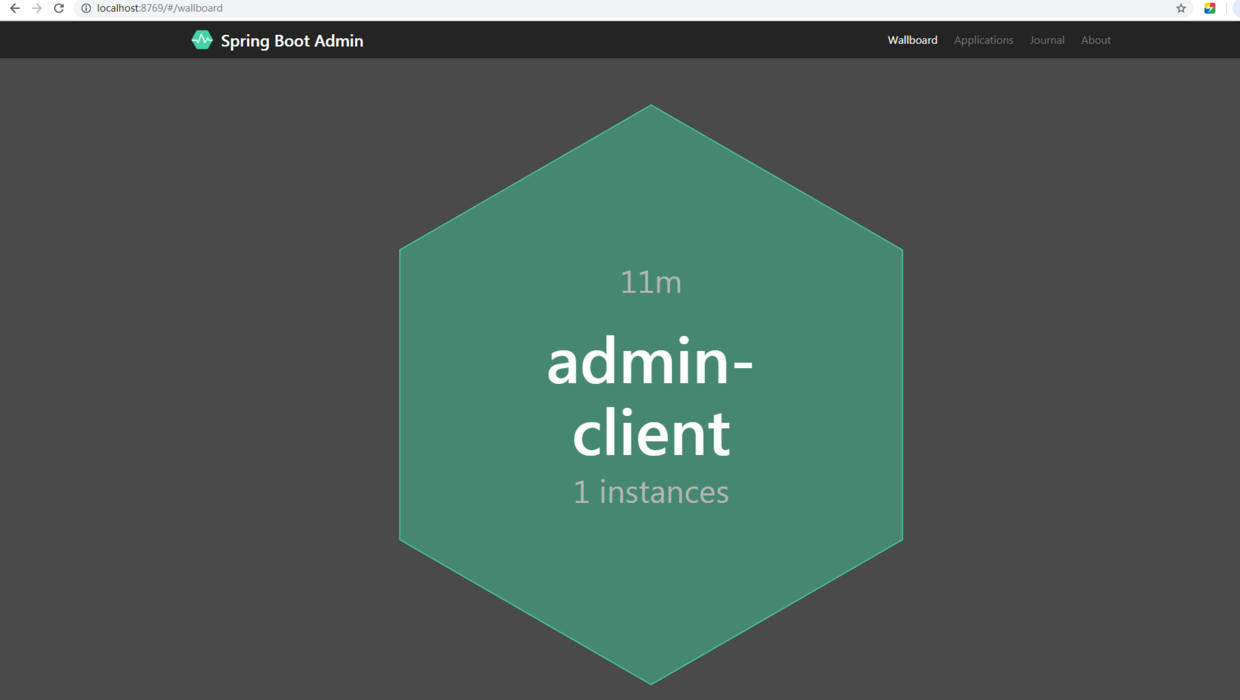
点击wallboard,可以查看admin-client具体的信息,比如内存状态信息:
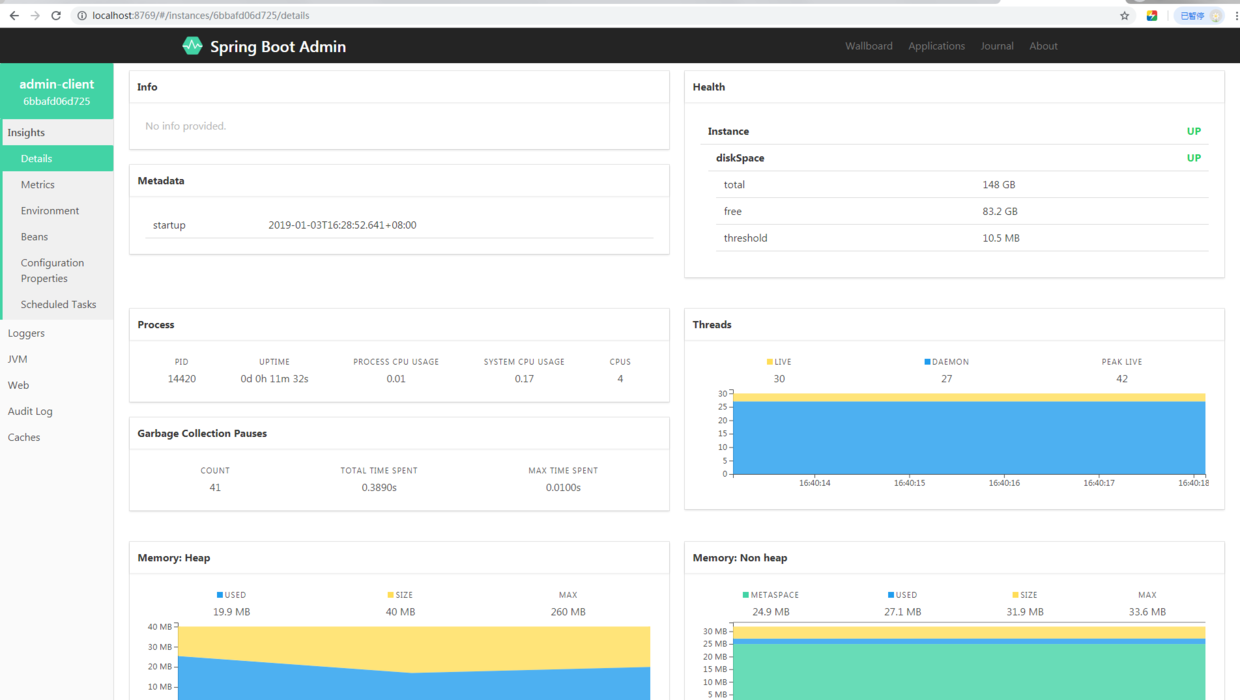
也可以查看spring bean的情况:
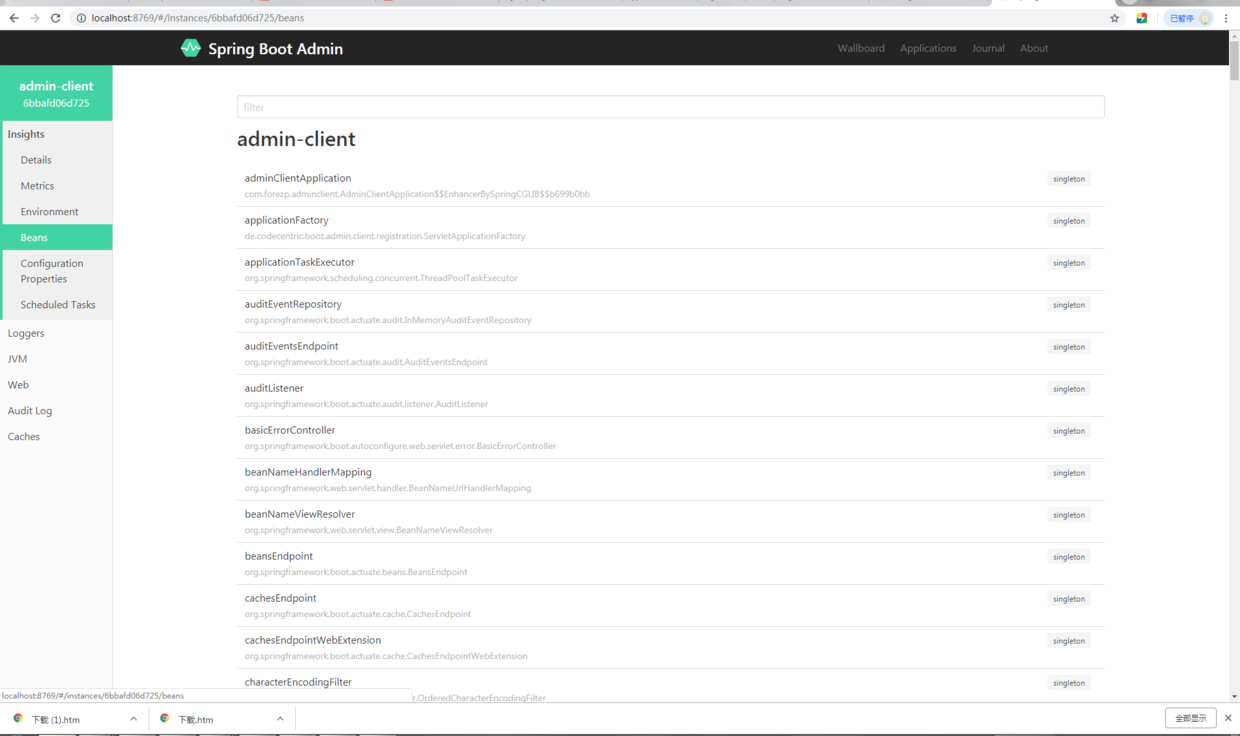
更多监控信息,自己体验。
Spring boot Admin结合SC注册中心使用
同上一个案例一样,本案例也是使用的是Spring Boot版本为2.1.0 、Spring Cloud版本为Finchley.SR2。案例采用Maven多module形式,父pom文件引入以下的依赖(完整的依赖见源码),此处省略。
搭建注册中心
注册中心使用Eureka、使用Consul也是可以的,在eureka-server工程中的pom文件中引入:
<dependency>
<groupId>org.springframework.cloud</groupId>
<artifactId>spring-cloud-starter-netflix-eureka-server</artifactId>
</dependency>
配置eureka-server的端口信息,以及defaultZone和防止自注册。最后系统暴露eureka-server的actuator的所有端口。
spring:
application:
name: eureka-server
server:
port: 8761
eureka:
client:
service-url:
defaultZone: http://localhost:8761/eureka
register-with-eureka: false
fetch-registry: false
management:
endpoints:
web:
exposure:
include: "*"
endpoint:
health:
show-details: ALWAYS
在工程的启动文件EurekaServerApplication加上@EnableEurekaServer注解开启Eureka Server.
@SpringBootApplication
@EnableEurekaServer
public class EurekaServerApplication {
public static void main(String[] args) {
SpringApplication.run( EurekaServerApplication.class, args );
}
}
eureka-server搭建完毕。
搭建admin-server
在admin-server工程的pom文件引入admin-server的起步依赖、web的起步依赖、eureka-client的起步依赖,如下:
<dependency>
<groupId>de.codecentric</groupId>
<artifactId>spring-boot-admin-starter-server</artifactId>
<version>2.1.0</version>
</dependency>
<dependency>
<groupId>org.springframework.boot</groupId>
<artifactId>spring-boot-starter-web</artifactId>
</dependency>
<dependency>
<groupId>org.springframework.cloud</groupId>
<artifactId>spring-cloud-starter-netflix-eureka-client</artifactId>
</dependency>
然后配置admin-server,应用名、端口信息。并向注册中心注册,注册地址为http://localhost:8761,最后将actuator的所有端口暴露出来,配置如下:
spring:
application:
name: admin-server
server:
port: 8769
eureka:
client:
registryFetchIntervalSeconds: 5
service-url:
defaultZone: ${EUREKA_SERVICE_URL:http://localhost:8761}/eureka/
instance:
leaseRenewalIntervalInSeconds: 10
health-check-url-path: /actuator/health
management:
endpoints:
web:
exposure:
include: "*"
endpoint:
health:
show-details: ALWAYS
在工程的启动类AdminServerApplication加上@EnableAdminServer注解,开启admin server的功能,加上@EnableDiscoveryClient注解开启eurke client的功能。
@SpringBootApplication
@EnableAdminServer
@EnableDiscoveryClient
public class AdminServerApplication {
public static void main(String[] args) {
SpringApplication.run( AdminServerApplication.class, args );
}
}
搭建admin-client
在admin-client的pom文件引入以下的依赖,由于2.1.0采用webflux,引入webflux的起步依赖,引入eureka-client的起步依赖,并引用actuator的起步依赖如下:
<dependency>
<groupId>org.springframework.boot</groupId>
<artifactId>spring-boot-starter-webflux</artifactId>
</dependency>
<dependency>
<groupId>org.springframework.cloud</groupId>
<artifactId>spring-cloud-starter-netflix-eureka-client</artifactId>
</dependency>
<dependency>
<groupId>org.springframework.boot</groupId>
<artifactId>spring-boot-starter-actuator</artifactId>
</dependency>
在工程的配置文件配置应用名、端口、向注册中心注册的地址,以及暴露actuator的所有端口。
spring:
application:
name: admin-client
eureka:
instance:
leaseRenewalIntervalInSeconds: 10
health-check-url-path: /actuator/health
client:
registryFetchIntervalSeconds: 5
service-url:
defaultZone: ${EUREKA_SERVICE_URL:http://localhost:8761}/eureka/
management:
endpoints:
web:
exposure:
include: "*"
endpoint:
health:
show-details: ALWAYS
server:
port: 8762
在启动类加上@EnableDiscoveryClie注解,开启DiscoveryClient的功能。
@SpringBootApplication
@EnableDiscoveryClient
public class AdminClientApplication {
public static void main(String[] args) {
SpringApplication.run( AdminClientApplication.class, args );
}
}
一次启动三个工程,在浏览器上访问localhost:8769,浏览器会显示和上一小节一样的界面。
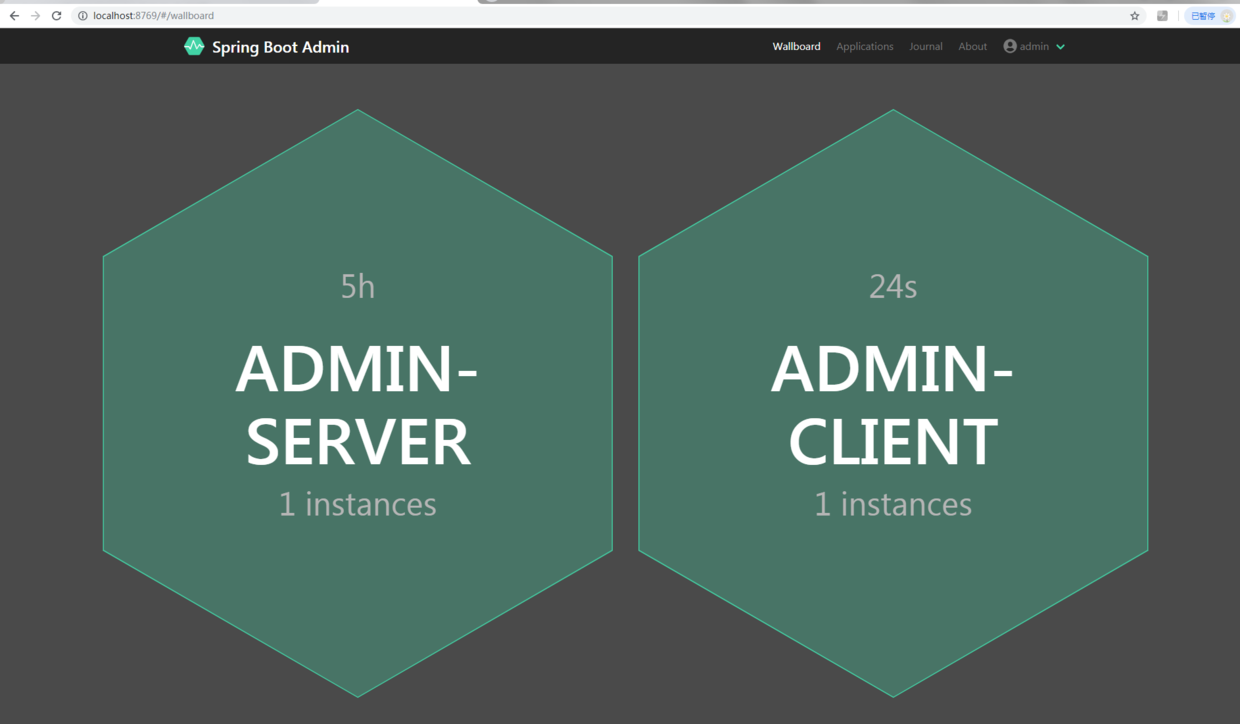
集成spring security
在2.1.0版本中去掉了hystrix dashboard,登录界面默认集成到了spring security模块,只要加上spring security就集成了登录模块。
只需要改变下admin-server工程,需要在admin-server工程的pom文件引入以下的依赖:
<dependency>
<groupId>org.springframework.boot</groupId>
<artifactId>spring-boot-starter-security</artifactId>
</dependency>
在admin-server工的配置文件application.yml中配置spring security的用户名和密码,这时需要在服务注册时带上metadata-map的信息,如下:
spring:
security:
user:
name: "admin"
password: "admin"
eureka:
instance:
metadata-map:
user.name: ${spring.security.user.name}
user.password: ${spring.security.user.password}
写一个配置类SecuritySecureConfig继承WebSecurityConfigurerAdapter,配置如下:
@Configuration
public class SecuritySecureConfig extends WebSecurityConfigurerAdapter {
private final String adminContextPath;
public SecuritySecureConfig(AdminServerProperties adminServerProperties) {
this.adminContextPath = adminServerProperties.getContextPath();
}
@Override
protected void configure(HttpSecurity http) throws Exception {
// @formatter:off
SavedRequestAwareAuthenticationSuccessHandler successHandler = new SavedRequestAwareAuthenticationSuccessHandler();
successHandler.setTargetUrlParameter( "redirectTo" );
http.authorizeRequests()
.antMatchers( adminContextPath + "/assets/**" ).permitAll()
.antMatchers( adminContextPath + "/login" ).permitAll()
.anyRequest().authenticated()
.and()
.formLogin().loginPage( adminContextPath + "/login" ).successHandler( successHandler ).and()
.logout().logoutUrl( adminContextPath + "/logout" ).and()
.httpBasic().and()
.csrf().disable();
// @formatter:on
}
}
重启启动工程,在浏览器上访问:http://localhost:8769/,会被重定向到登录界面,登录的用户名和密码为配置文件中配置的,分别为admin和admin,界面显示如下:
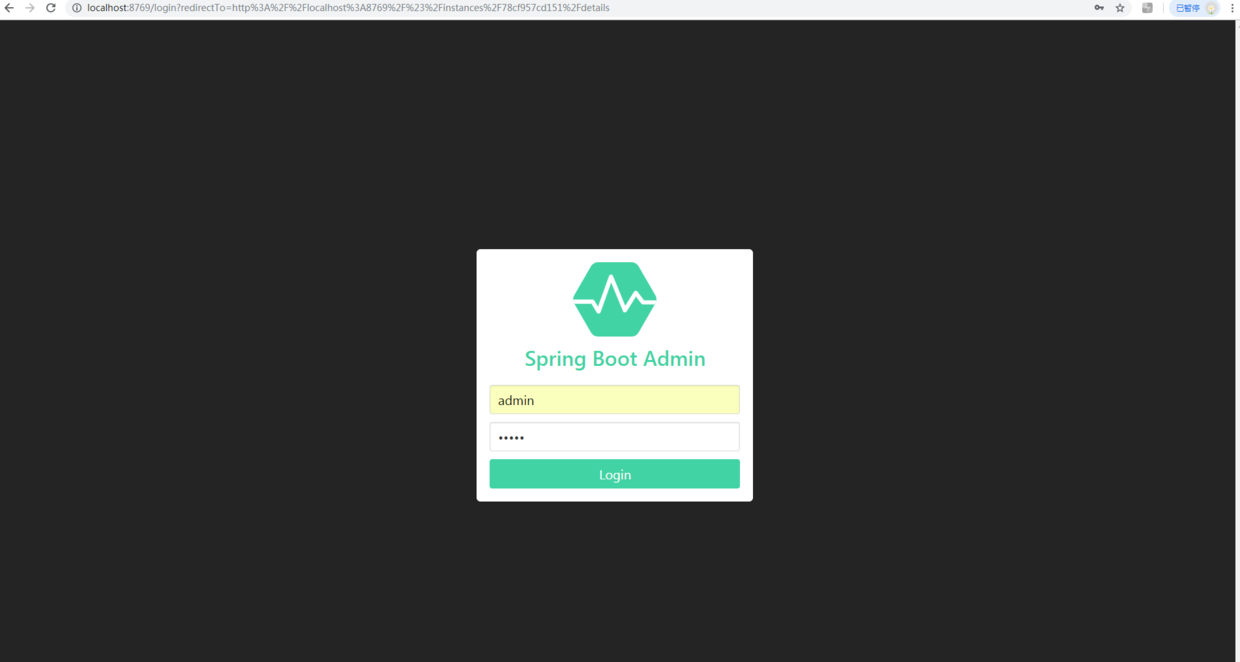
集成邮箱报警功能
在spring boot admin中,也可以集成邮箱报警功能,比如服务不健康了、下线了,都可以给指定邮箱发送邮件。集成非常简单,只需要改造下admin-server即可:
在admin-server工程Pom文件,加上mail的起步依赖,代码如下:
<dependency>
<groupId>org.springframework.boot</groupId>
<artifactId>spring-boot-starter-mail</artifactId>
</dependency>
在配置文件application.yml文件中,需要配置邮件相关的配置,如下:
spring.mail.host: smtp.163.com
spring.mail.username: miles02
spring.mail.password:
spring.boot.admin.notify.mail.to: 124746406@qq.com
做完以上配置后,当我们已注册的客户端的状态从 UP 变为 OFFLINE 或其他状态,服务端就会自动将电子邮件发送到上面配置的地址。
源码下载
快速开始: github.com/forezp/Spri…
和spring cloud结合:github.com/forezp/Spri…
参考资料
codecentric.github.io/spring-boot…

扫一扫,支持下作者吧
(转载本站文章请注明作者和出处 方志朋的博客)